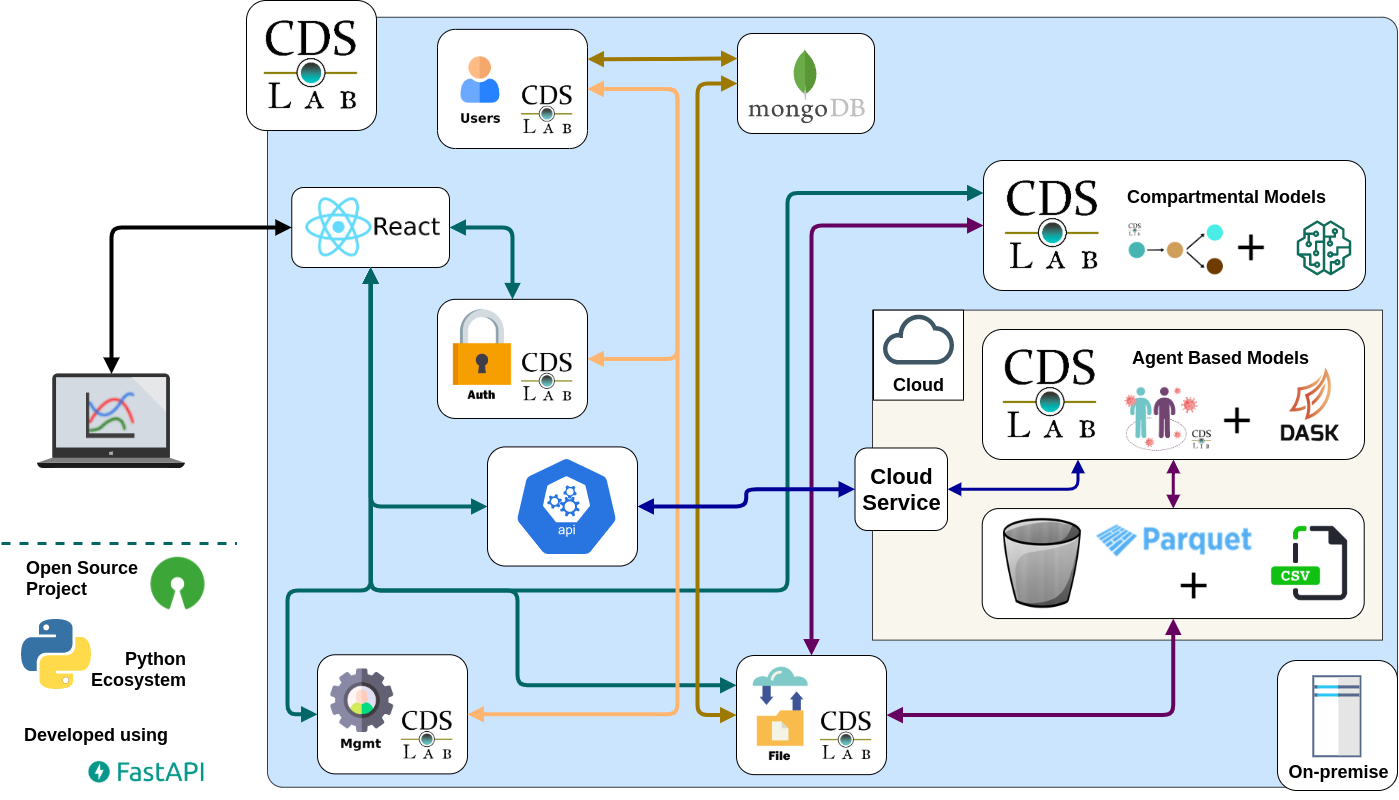Welcome to the Contagious Disease Simulation Library (CDSLib).
This is an open source initiative made available to researchers, decision makers and the general public.
This projects aims to be a workplace for addressing different epidemic modelling frameworks, in order to tackle potential epidemics and related issues using open source high performance computing.
We encourage other scientist to contribute to this project, so that complex models they produce are available not only for researching but for helping decision makers to take decisions based in the most advanced models.
The CDSLib_agents module implements an agent based model describing contagion dynamic in different scenarios, from small compartments to cities.
The CDSLib_cmodels module implements a dynamical deterministic model describing epidemics following a SEIRV model.
This is the web application created for supporting the optimal deployment and use of CDSLib models for using High Performance Computing through Google Cloud Platform.
The CDSLab_auth module implements an authentication/authorization API for CDSLab.
The CDSLab_management module implements an admin/settings API for CDSLab.
The CDSLab_users_api module implements users' CRUD operations API for CDSLab.
The CDSLab_cmodels_api module implements an API for CDSLab consumption of CDSLib_cmodels module.
Please review our contributing document
This projects began as a voluntary initiative from some members of the Fundamentals and Teaching of Physics and Dynamical Systems Group (FEnFiSDi) from Universidad de Antioquia (UdeA) in March 2020 to bring our technical and theoretical skills on natural systems modelling to the emerging sanitary thread posed by the COVID-19 pandemic. After joining forces with the Epidemiology Group of UdeA and recruiting more members of our research group, we began a new phase with funding from the National Ministry of Science and Technology and the National Learning Service.
We believe in the transformative power science has in society. We are committed to bring scientific knowledge to society and this is our way to help during this challenging scenario we are facing as humanity.
We are the Fundamentals and Teaching of Physics and Dynamical Systems Group from Universidad de Antioquia in Medellin, Colombia. Our work ranges from research to science education. Our research has centered on gene regulatory networks, evolution of behaviour, city dynamics, weather and information theory. Visit our page for further information: Fundamentos y Enseñanza de la Física y los Sistemas Dinámicos
- Boris Rodriguez, Physics Professor, Universidad de Antioquia
- Isabel Hoyos, Physics Professor, Universidad del Quindío
- Paula Díaz, Public Health Professor, Universidad de Antioquia
- Gloria Machado, Biology Professor, Universidad de Antioquia
- Camilo Hincapié, Data Scientist, Physics MSc, Universidad de Antioquia
- Lina Ruiz, Biology MSc Student
- Nicole Rivera, Physics BSc Student
- Juan Esteban Aristizábal, Physics BSc
- Mariana Jaramillo, Physics BSc Student
- Elías De Vargas, Systems Engineer
- Luis Papiernik, Physics BSc Student
- Elkin Bonet, Public Health MSc Student
- Sebastián Espejo, Biologist, UdeA
- Shirley Cárcamo, Biologist, UdeA
- Óscar Mendoza, Public Health MSc Student
- Carolina Rojas, Astronomy BSc Student
- Juan Pablo Pérez
- Sofía Sánchez, Biology BSc Student
- Andrea Sánchez, Public Health BSc Student
- Ian Mejía, Physics BSc Student
- Alejandro Campillo Barrios, Bioengineering BSc Student
For more information on our current sponsors visit:
Special thanks to our providers who contribute their expertise to develop this library and platform at a professional level.
We pretend to extend our work beyond the COVID-19 pandemic to different diseases currently affecting human health or epidemics yet to come. According to the Intergovernmental Science-Policy Platform on Biodiversity and Ecosystem Services, future pandemics are expected to happen more often https://www.ipbes.net/pandemics-media-release.
